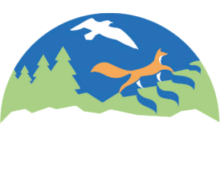“THE RICHNESS OF ITS WETLANDS”
The National Park of East Macedonia – Thrace which was established following interministerial decision 5796/1996, is one of the largest wetland parks in Greece and it covers an area of 93,000 ha. It stands out for its great biological, aesthetic, scientific, geomorphological, and educational value. The National Park embrace’s the protected areas of Nestos Delta, Lake Vistonida, Lake Ismarida wetlands and their surrounding areas. Since 1971 the above wetlands have been protected in both national and European level as they are included in the Ramsar Convention on Wetlands of International Importance.
Vistonida Lake and lagoons complex
Lake Vistonida is the fourth largest lake in Greece, with a total area of 4,200 ha and an average depth of 2.5 metres. It extends in the Regional Districts of Xanthi and Rodopi and is one of the most beautiful wetlands in Greece, with both lagoon and lake features of exceptional ecological value. The wetland complex of Vistonida includes lagoons in the west and south of the lake, open to Vistonikos bay, the largest of which are Lafrouda, Lafri, Lagos and Porto Lagos. The Porto Lagos area hosts a heron colony in a piny territory. The area of lake Vistonida also provides shelter to rare species of endemic fish, such as Shad of Vistonis (Alosa vistonica) and Shemaja of Vistonis (Alburnus vistonicus), to one of the rarest birds in the world, the White headed duck (Oxyura leucocephala), while it is a reproduction site of the Common Shelduck (Tadorna tadorna). Vistonida has a unique feature for Greece. Its northern part has fresh water due to the freshwater inflows from the rivers Kosynthos, Kompsatos and Travos (or Aspropotamos), while its southern part, which receives seawater from the orifices communicating with the Porto Lagos lagoon, is brackish with varying salinity.
Nestos Delta
It is one of the most important wetlands in Europe, since four different ecosystems and many habitats exists in the area. It extends in the southern borders of the Regional Districts of Kavala and Xanthi, covering a total area of approximately 50,000 ha and is geographically defined by the villages of Nea Karvali in the west, Toxotes in the north and Abdera in the east. From an ecological point of view, the riparian “Kotza Orman” forest (Great Forest), which currently occupies 450 ha, is of particular importance. This once huge, rare type of forest, which stretched over an area 25 times its current size, was renowned for its natural beauty and unspoiled vegetation, with trees reaching 40 m in height and 2 m in diameter. Today, although quite limited, it still retains many of its original characteristics. Nestos Delta wider area is the home of rare species such as the Golden Jackal (Canis aureus), the Otter (Lutra lutra), the Spur-winged Plover (Vanellus spinosus) and the only genetically pure native population of Common Pheasant (Phasianus colchicus).
Ismarida Lake & Rhodope Lagoons
Lake Ismarida (Mitrikou), covering approximately 3,200 ha, is the only freshwater lake in Thrace, which hosts a total of 330 species of fauna. It is a small in size with shallow waters lake, having a maximum depth of no more than 1.5 metres. In the south, it connects to the Thracian Sea via a 5.2km channel. In the north Vosvozis river outflows into the lake, forming a small delta, while Lissos (Filiouris) flows in from east. The Lagoons Xirolimni (Fanari), Arogi (Karatza), Alyki (Mesi), Ptelea and Elos, extend in the west of Ismarida and host some rare bird species, such as the Glossy Ibis (Plegadis falcinellus), the White-tailed Eagle (Haliaeetus albicilla) and the Squacco heron (Ardeola ralloides).
The Management Body of the Nestos Delta and Lakes Vistonida-Ismarida (current Management Unit of Nestos -Vistonida and Rhodope National Parks ) was established by virtue of Law 3044/2002 and constitutes the statutory body of the National Park of Eastern Macedonia – Thrace (NP EMATH), with the following main responsibilities:
- The conservation of the natural resources and biodiversity of the NP EMATH
- The restoration and maintenance of ecological balance in the NP EMATH
- Informing and raising awareness among citizens in the region
- Promotion of environmental friendly human activities
- Environmental education and the development of ecotourism
- The social, economic and cultural development of the wider region






